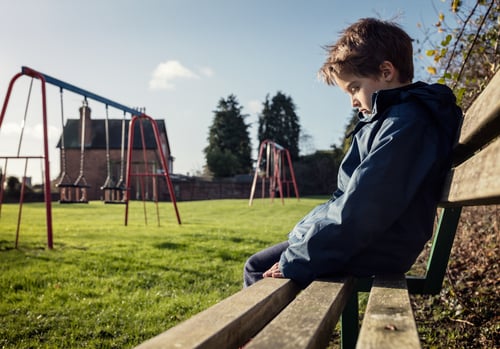Childhood emotional neglect is a form of child abuse that encompasses a range of behaviors that can be far less obvious than wounds caused by physical abuse. Children can be hurt by their parents or caretakers in ways that don’t include afflicting physical pain and injury.
As terrible as physical abuse is, emotional neglect can be just as damaging and leave significant consequences that continue to follow the neglected child into adulthood and influence their lives in many different ways.
As a form of emotional abuse, child neglect occurs when parents or caretakers fail to acknowledge their child’s emotional needs and appropriately respond to them. This lack of attention to a child’s emotional needs can lead to a variety of negative psychological effects.
Self-isolation, fear, and distrust are some of the most common ones, and in a lot of cases, they translate into lifelong psychological issues. These problems can manifest in many ways, including; educational difficulties, low self-esteem, depression, anxiety, and trouble forming and maintaining relationships.
What Are The Forms of Child Neglect?
Neglect, as a form of child abuse, involves not meeting the children’s basic needs: physical, medical, educational, and emotional. Physical abuse is just one type of child abuse. Emotional abuse or neglect can inflict just as much damage. Since the signs are not always as obvious, other people may be less likely to notice and intervene.
It’s important to note that some parents don’t mean to harm their children intentionally, they simply might not know any better due to their own upbringing. Both neglect and abuse can be a cycle that repeats for generations. This is called generational trauma which is the transmission (sending down to younger generations) of oppressive or traumatic effects of a historical event.
Parents who have been victims of abuse or neglect themselves might not even realize they’re doing it; they simply don’t know a better way to parent. Some are struggling with mental health or substance abuse disorders. However, this type of behavior doesn’t happen only in a certain ‘type’ of family or community. It crosses all economic, racial, or cultural borders.
There are different forms of child neglect and not all of them have to be present at the same time. Generally, ignoring a child’s needs or not paying enough attention to them and leaving them unsupervised can lead to dangerous situations. Even though small children can lack the capacity to understand that there’s something wrong, this type of behavior can still make them feel worthless and unloved, and leave deep, lasting scars and emotional harm that follow them into adulthood.
Neglect can involve a lot of different behaviors, or lack of behavior, which makes it hard to notice. However, in broad terms, there are generally 4 types of neglect:
- Physical neglect involves denying a child the most basic needs like food, shelter, and clothing. This also includes the lack of proper supervision to keep the child safe. Protecting a child from physical harm starts during pregnancy.
- Medical neglect is also a particularly harmful one since it can result in grave consequences to a child’s health or even their life. A child needs proper health care and dental care. Some parents fail to notice or react to their child being sick or hurt or might ignore medical recommendations for various reasons.
- Educational neglect is pretty straightforward to understand, it simply means that parents fail to ensure that their child has access to proper education. It also includes tending to learning disabilities that go undiagnosed or untreated.
- Emotional neglect can be a quite complicated one to both define and notice. In the simplest of terms, an emotionally neglected child doesn’t receive the nurture, attention, and stimulation they require. This usually involves ignoring their needs for affection and attention, but it may go as far as humiliating or intimidating them.

What Are The Examples Of Childhood Emotional Neglect?
Even though child neglect can often go unnoticed, the ongoing failure to satisfy the most basic physical and emotional needs usually has some obvious telltale signs. There are ways to notice that a child’s basic needs are persistently not met.
The most obvious examples and effects of neglect on child development include:
- Lack of adequate supervision, or being left alone at home.
- Loss of parent due to death, addiction, mental illness, etc. with no help or support.
- Parent not seeing what the child needs and parenting from a place to selfishly get their own needs met.
- Constant signs of hunger or tiredness.
- Poor personal hygiene.
- Unclean or worn-out clothing.
- Untreated medical problems or injuries.
- Being subjected to frequent or unfair punishment.
- Not showing any affection.
- Speaking to a child in a way that makes them feel worthless.
- Dragging them into a challenging divorce.
- Overdisclosing information that is too advanced for a child.
- Parentifying them at a young age to care for other siblings and/or discharge emotions onto them as if they were the spouse of their parent.
- Not allowing the child to express their views or feelings.
- Preventing the child from engaging in usual social activities, leading to poor social relationships and skills.
- Exposing a child to seeing or hearing the abuse of someone else.
What Are the Long-Term Consequences Of Child Neglect?
All types of abuse and neglect leave lasting scars. Childhood neglect is linked to physical, psychological, and behavioral consequences. They could be independent of each other but are usually interrelated.
Scars of emotional neglect aren’t physical unless they involve injury or self-harm as a very severe consequence. Another way that neglect may cause physical consequences is by inhibiting the development of the child’s brain, leading to psychological issues.
However, emotional scarring also leaves lasting effects throughout one’s life because a child’s sense of self gets damaged, influencing future relationships, and their ability to function in various social environments.
The most common consequences of emotional neglect that carry over to adulthood include a wide range of feelings deeply rooted into one’s personality. A person suffering from the long-term effects of child neglect might be able to understand some of the circumstances or elements of their upbringing that caused them to feel or behave in a certain way, while others can be deeply hidden and subconscious.
The most common long-term consequences are usually:
- The feeling of emptiness and no sense of purpose.
- Not being able to identify or express your own emotions.
- Attachment difficulties and fear of depending on other people.
- Strong fear of rejection.
- Low self-esteem and self-doubt.
- Feeling “different” from others, and having poor relational skills.
- Lack of compassion for both self and others.
- Constant negative feelings like shame, guilt, or self-blame.
- Not being able to stand up for oneself and be assertive.
- Suffering from mental health issues, most commonly anxiety, depression, or posttraumatic stress.
- High-risk behaviors, like alcohol and drug abuse, criminal behavior, or unhealthy sexual behavior.
How Does Child Neglect Affect Adulthood?
Unfortunately, the emotional neglect someone has been exposed to during childhood isn’t something they can simply grow out of and move on. Its effects are lasting and strongly influence a person’s life, worldview, and relationships with others, mainly romantic partners, family, and friends.
Consequences of neglect in early childhood lead to:
- Lack of trust and relationship difficulties. Learning to trust people is crucial for maintaining healthy adult relationships. Adults that were neglected as children might not know what a good relationship is.
- Feeling “worthless” or undeserving. These feelings are extremely hard to overcome if you grew up with them. They may cause a lack of ambition, neglecting your education, or settling for less because you don’t believe you deserve more.
- Emotion regulation issues. People who were neglected in childhood may have difficulty identifying their emotions or feeling safe to express them. This is why they bottle down and suppress their true personality, views, and emotions until they burst out in unexpected ways. Anxiety, depression, or anger are common mental health issues that may lead to alcohol or drug use to escape painful feelings.
When it comes to forming relationships with other people, particularly romantic ones, the consequences of child neglect can present a specific type of challenge. People who suffered emotional neglect as children have difficulty trusting other people, so relying on their partners or depending on others can make them feel uncomfortable and cause fear or anxiety.

PIVOT’s Here To Help You With The Negative Consequences Of Childhood Emotional Neglect With Expert Intimacy Coaching
Being or becoming aware of the damage childhood neglect has caused doesn’t mean you can just snap out of it. It’s difficult to unlearn all the patterns of behavior and feeling whose seeds were planted so long ago and are now deeply seated in every part of your being. When it comes to achieving healthy romantic relationships, resolving these issues and finding your authentic self are crucial. It takes compassion and willingness, as well as professional help to begin unpacking the damage that was done to you so long ago. Emotional intimacy coaching is an integral part of the healing process. It helps you adopt new ways of thinking and deal with your unresolved feelings. Let our PIVOT relationship advocates guide you along the way to new and healthy behavior patterns. With the PIVOT process, behavioral change is possible!